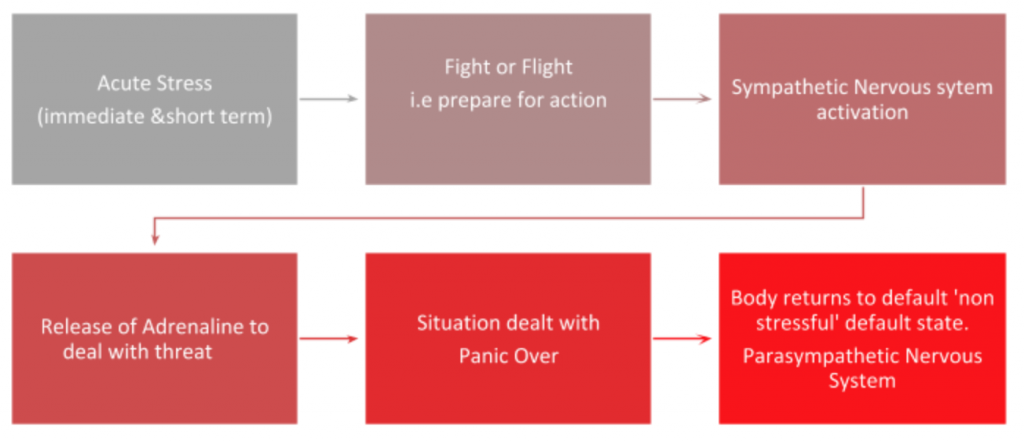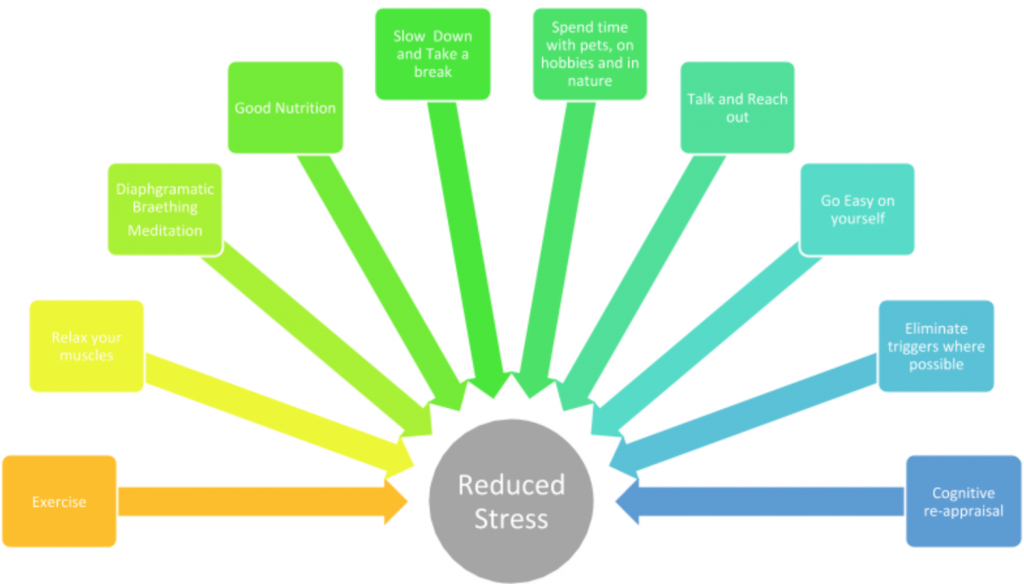How changing your response to Stress can change your chronic pain.
Pain and stress are inherently linked and understanding the significance of this and being able to change your physical response to stress can be beneficial to people suffering from chronic pain condition.
Stress is a normal part of life and experienced by everyone, and in fact our typical, normal responses to it are useful and designed to help us survive.
Human Stress Response: ACUTE

So, you can see that Acute stress is dealt with in a way that has a favourable end point.
Human Stress Response: CHRONIC CYCLE

In comparison to the Acute Stress response, the Chronic response is a cycle! In the shorter term it results in increased cortisol levels, but eventually as time goes on, if things do not change it has the effect of very low cortisol levels. Low cortisol is equally bad for us, causing metabolic disturbances and low blood pressure and further stress, amongst other things.
A body in a pain state is stressed, so chronic pain feeds into this cycle and ultimately, a prolonged stress response may perpetuate cortisol dysfunction, widespread inflammation and pain.
Changing your response to stress
Humans have the capacity to modify our response to stress, either by changing what we perceive as stressful, or changing our response to it.
There are lots of things you can do to break help this cycle:

How can Physiotherapy help?
EXERCISE
- Advising on and prescribing appropriate exercise and progressing this as needed. Cardiovascular exercise is particularly important but you may also need strengthening work. Your physiotherapist can work with you to help you reach your goals in a way that is hopefully enjoyable without flaring your pain.
DIAPHRAGMATIC BREATHING
- Teaching you how to diaphragmatically breathe and give you tips on incorporating this into your life. Diaphragmatic breathing stimulates the parasympathetic nervous system and is a useful tool for changing your response to stress. It also helps to restore ideal blood gas levels, which can be significantly disturbed with a dysfunctional breathing pattern common in chronic stressed states.
RELAXING YOUR MUSCLES
- Your Physiotherapist can teach you techniques to increase your awareness around where you maybe carrying excess muscle tone as well as how to reduce this. Excess muscle tone and tension can contribute to painful states.
COGNITIVE RE-APPRAISAL
- Your physiotherapist can help you identify beliefs and behaviours that may not be helpful.
- There are many examples but a few are things like catastrophising, fear of damage, fear of pain, fear of future physical capabilities. All of these can lead to increased stress and worry.
If you have any questions about this blog or would like some more advice, please do not hesitate to reach out, our qualified Physiotherapists are more than happy to help. Simply call the clinic on (08) 9279 7411 today!
Author

Sarah Clay
Senior Physiotherapist & Senior Pilates Instructor
South Australian Institute Technology 1987
Sarah is an experienced Physiotherapist with over 30 years industry musculoskeletal experience. She passionate about facilitating change in peoples lives holistically, especially those with chronic or complex pain. She has a special interest in Cognitive Functional Techniques and is currently undergoing further, extensive training in this area, centred around low back pain.
Her holistic approach has involved extra training in Nutrition as well as breathing disorders and techniques.
To learn more about Sarah, click here.











